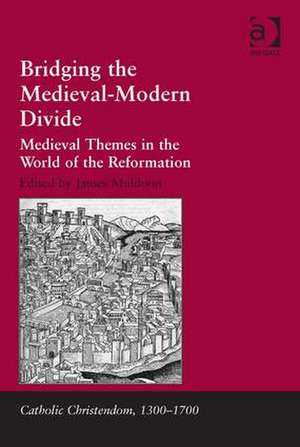Bridging the Medieval-Modern Divide: Medieval Themes in the World of the Reformation: Catholic Christendom, 1300-1700
Editat de James Muldoonen Limba Engleză Hardback – 28 feb 2013
| Toate formatele și edițiile | Preț | Express |
|---|---|---|
| Paperback (1) | 260.33 lei 43-57 zile | |
| Taylor & Francis – 14 oct 2024 | 260.33 lei 43-57 zile | |
| Hardback (1) | 1060.25 lei 43-57 zile | |
| Taylor & Francis – 28 feb 2013 | 1060.25 lei 43-57 zile |
Din seria Catholic Christendom, 1300-1700
- 9%
 Preț: 1038.14 lei
Preț: 1038.14 lei - 15%
 Preț: 269.84 lei
Preț: 269.84 lei - 18%
 Preț: 1000.27 lei
Preț: 1000.27 lei -
 Preț: 388.13 lei
Preț: 388.13 lei -
 Preț: 416.22 lei
Preț: 416.22 lei - 25%
 Preț: 825.06 lei
Preț: 825.06 lei -
 Preț: 416.22 lei
Preț: 416.22 lei -
 Preț: 469.34 lei
Preț: 469.34 lei - 18%
 Preț: 1055.69 lei
Preț: 1055.69 lei - 18%
 Preț: 1054.71 lei
Preț: 1054.71 lei - 18%
 Preț: 1008.17 lei
Preț: 1008.17 lei - 18%
 Preț: 1062.62 lei
Preț: 1062.62 lei -
 Preț: 436.14 lei
Preț: 436.14 lei - 18%
 Preț: 1063.41 lei
Preț: 1063.41 lei - 15%
 Preț: 259.31 lei
Preț: 259.31 lei - 31%
 Preț: 767.95 lei
Preț: 767.95 lei -
 Preț: 465.39 lei
Preț: 465.39 lei - 18%
 Preț: 1059.45 lei
Preț: 1059.45 lei - 16%
 Preț: 237.38 lei
Preț: 237.38 lei - 18%
 Preț: 1054.71 lei
Preț: 1054.71 lei - 18%
 Preț: 1060.74 lei
Preț: 1060.74 lei - 25%
 Preț: 769.92 lei
Preț: 769.92 lei -
 Preț: 436.14 lei
Preț: 436.14 lei - 18%
 Preț: 1054.71 lei
Preț: 1054.71 lei -
 Preț: 436.14 lei
Preț: 436.14 lei - 18%
 Preț: 1061.81 lei
Preț: 1061.81 lei - 28%
 Preț: 822.76 lei
Preț: 822.76 lei - 18%
 Preț: 1116.27 lei
Preț: 1116.27 lei - 18%
 Preț: 1056.14 lei
Preț: 1056.14 lei - 18%
 Preț: 1000.27 lei
Preț: 1000.27 lei - 18%
 Preț: 1109.18 lei
Preț: 1109.18 lei - 16%
 Preț: 299.52 lei
Preț: 299.52 lei - 16%
 Preț: 260.73 lei
Preț: 260.73 lei - 28%
 Preț: 821.53 lei
Preț: 821.53 lei - 18%
 Preț: 1005.01 lei
Preț: 1005.01 lei - 28%
 Preț: 820.71 lei
Preț: 820.71 lei - 18%
 Preț: 1008.86 lei
Preț: 1008.86 lei
Preț: 1060.25 lei
Preț vechi: 1292.98 lei
-18% Nou
Puncte Express: 1590
Preț estimativ în valută:
202.91€ • 211.05$ • 167.51£
202.91€ • 211.05$ • 167.51£
Carte tipărită la comandă
Livrare economică 14-28 aprilie
Preluare comenzi: 021 569.72.76
Specificații
ISBN-13: 9781409447634
ISBN-10: 1409447634
Pagini: 256
Dimensiuni: 156 x 234 x 16 mm
Greutate: 0.61 kg
Ediția:1
Editura: Taylor & Francis
Colecția Routledge
Seria Catholic Christendom, 1300-1700
Locul publicării:Oxford, United Kingdom
ISBN-10: 1409447634
Pagini: 256
Dimensiuni: 156 x 234 x 16 mm
Greutate: 0.61 kg
Ediția:1
Editura: Taylor & Francis
Colecția Routledge
Seria Catholic Christendom, 1300-1700
Locul publicării:Oxford, United Kingdom
Cuprins
Contents: Preface; Introduction: bridging the medieval-modern divide, James Muldoon; Medieval roots of the modern image of Islam: fact and fiction, Meriem Pages; Toleration in medieval Europe: theoretical principles and historical lessons, Cary J. Nederman; ’Atheism’ in late medieval travel writings, Margaret Kim; Purgatory and modernity, George Dameron; The revival of medieval biblical exegesis in the early modern world: the example of Carolingian biblical commentaries, Burton Van Name Edwards; Continuity or radical change? Care of the poor, medieval and early modern, Jeannine Olson; Rights, property, and the creation of international law, James Muldoon; ’A divine precept of fraternal union’: the maxim Quod omnes tangit in Anglo-American thought to the ratification of the constitution, Bruce Braisington; Afterword; Index.
Recenzii
'Bridging the Medieval-Modern Divide lives up to its title. The essays contained within are varied and often quite differing in their approach to the historiography of the fuzzy distinction between the Middle Ages and the early modern period. ... James Muldoon has inspired a most constructive work, one that will hopefully continue to flower and gradually fill the gap between the medieval and the early modern.' Sixteenth Century Journal
Descriere
Covering a broad range of topics - encompassing legal, social, cultural, theological and political history - the volume asks fundamental questions about how we regard history, and what historians can learn from colleagues working in other fields that may not at first glance appear to offer any obvious links. By focusing on the concept of the medieval-modern divide - in particular the relation between the Middle Ages and the Reformation - each essay examines how a medievalist deals with a specific topic or issue that is also attracting the attention of Reformation scholars.







